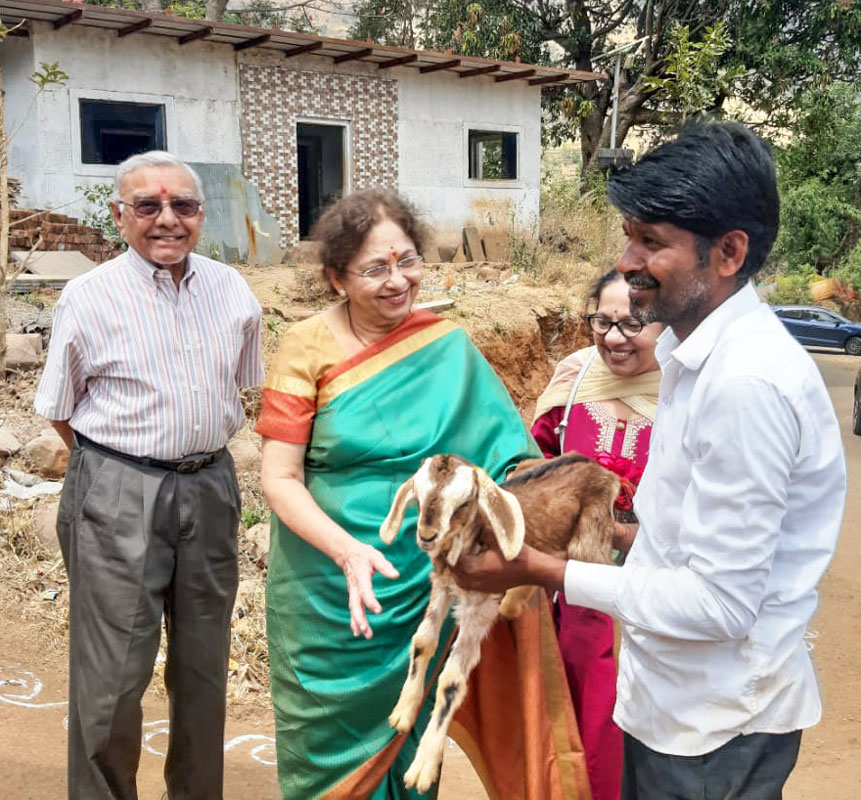Oholi is a medium-sized village on the hills of Raireshwar in Satara district of Maharashtra, with 400 people in 121 households. Rotary Club of Wai, RID 3132, has been working for its holistic transformation for over four years, providing the village with water, helping the villagers build ‘pucca’ homes and facilitating a decent livelihood for them.

“The women and children would spend 3–4 hours daily fetching water. So we decided to address this issue on priority,” says Project Chair Swati Herkal. The club, through a global grant of $34,096, provided piped water for homes. A well was dug at the foothills and a reservoir was constructed in the village. Water was pumped from the well to the reservoir through a pipeline with the help of a powerful pump. The younger villagers helped in digging trenches on the mountainous terrain all the way up to the reservoir and to the front yard of the individual huts for laying the pipelines.
Bringing water to the village was a significant gift because it meant the villagers can now avail government support of ₹2 lakh for each household to transform their huts into concrete homes. “The government had promised the money to each dwelling provided they have a water connection,” says Swati. The villagers have already got the money and so far, 80 huts have been converted into concrete houses. “Now that they have a good home and enough water, we introduced kitchen gardens to help them grow their own fruits, vegetables and herbs. Children too are attending school regularly,” she added.
Goat farm
Next, the villagers requested sewing machines as well as papad/wafer making machines for the women to be gainfully employed. “But we had a different plan for them. We thought a goat farm will help the villagers better.” Not all families were willing to experiment with goats. So 35 families were chosen and each family was given five goats and a buck, and were also trained to rear them. The project cost $33,000 and was supported by RCs Niles, Plain Township and Salem of RID 6650, and TRF.
Swati recalls how the club members — Pramod Shinde, Jitendra Pathak and Ajit Pawar — took tremendous efforts to find the 210 special breed of goats that can survive the intense summer heat on the mountains. “These goats had to be bought from farmers raising them and willing to sell. Many times farmers promised to sell the drove to the Rotarians, but before they could reach their location, desperate for money, they would sell it to someone else.” There were times when the Rotarians left their homes at 3am to reach the farmer before the goats were sent for grazing in the mountains.
“Each family can earn up to ₹50,000 a year, as much as they would earn growing rice or millets,” she says. Goat milk is nutritious for children and elderly, and excess milk can be processed into cheese. The excreta is good manure for crops. The maintenance cost is also low as the cattle does not require expensive feeds and the government takes care of the yearly vaccination. The goats deliver two kids twice a year and so the farm size grows. “If a family has 20 goats, and even if they sell 10 of them, their income rises substantially.”
The Rotarians visited the village, along with PDG Meena Patel and her spouse Indu of RID 6650, to officially inaugurate the goat farm. “It was the first week of March, the early days of Covid-19 pandemic. Many youngsters who had migrated to bigger cities were returning to Oholi and seeing the transformation of their homeland, they have decided to stay back,” smiles Swati, adding that the other families who did not initially show interest in the goats were now coming forward to raise them now, seeing the big difference it has made economically to the 35 families.
Taking Oholi as a model village, she has now started working with five more villages to make them self-sustained. “Villagers should not migrate to cities. Let them enjoy and breathe the fresh village air and still live comfortably. We can provide them the resources,” she smiles.







